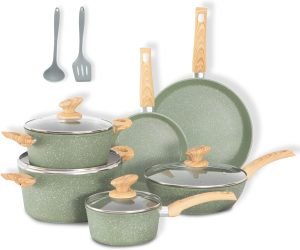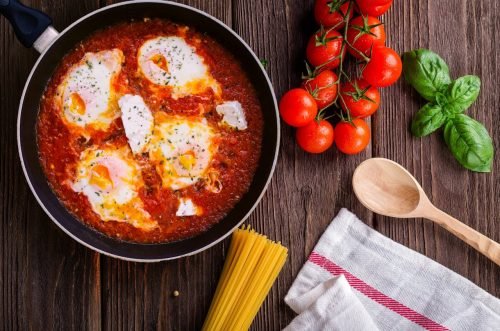What Is The Greenest Way To Cook?
Are you looking for ways to reduce your environmental impact in the kitchen? If so, you may be wondering what the greenest way to cook is. In a world where sustainability is becoming increasingly important, it’s crucial to consider how our cooking practices affect the planet. From gas stoves to slow cookers, this article will explore different cooking methods and their environmental implications. By the end, you’ll have a better understanding of which cooking techniques are the most eco-friendly, allowing you to make greener choices in your own kitchen. So, let’s dive into the world of sustainable cooking and discover the greenest way to cook!

Use Energy Efficient Appliances
Choose Induction Cooktops
When it comes to energy-efficient cooking, induction cooktops are a great choice. Unlike traditional electric or gas stoves, induction cooktops use magnetic fields to directly heat the cookware, making them more energy-efficient. They heat up quickly and provide precise temperature control, allowing you to cook your meals efficiently. Induction cooktops also have the added advantage of being safer, as they don’t generate a flame or direct heat. So, if you’re looking to reduce your energy consumption and cook more sustainably, consider investing in an induction cooktop.
Select Energy Star Rated Appliances
Another essential step in using energy-efficient appliances is choosing appliances that have received the Energy Star rating. Energy Star is a government-backed symbol that identifies appliances and electronics that are designed to use less energy. These appliances meet strict efficiency standards and can significantly reduce your energy consumption and utility bills. When shopping for appliances such as refrigerators, dishwashers, and ovens, look out for the Energy Star label to ensure that you’re making an eco-friendly choice.
Use Smaller Appliances
Using smaller appliances whenever possible can also contribute to greener cooking. Appliances such as toaster ovens, electric kettles, and slow cookers are more energy-efficient compared to their larger counterparts. They require less energy to heat up and cook food, making them a great option for small meals or when you’re cooking for just one or two people. So, instead of firing up your big oven for a small meal, consider using smaller appliances to save energy and reduce your carbon footprint.
Cook with Renewable Energy
Install Solar Panels
One of the most impactful ways to cook with renewable energy is by installing solar panels in your home. Solar panels harness the power of the sun and convert it into electricity, which can then be used to power your kitchen appliances and cook your meals. By investing in solar panels, you not only reduce your reliance on fossil fuels but also save money on your energy bills in the long run. It’s a sustainable and cost-effective way to cook with renewable energy.
Use Wind Energy
If solar panels are not feasible for your home, you can still cook with renewable energy by opting for wind energy. Some energy providers offer the option to purchase wind energy credits. This means that a portion of the energy you consume will be generated by wind turbines rather than fossil fuels. By choosing wind energy, you’re actively supporting the growth of renewable energy sources and minimizing your environmental impact.
Join a Community Green Energy Program
Another option to cook with renewable energy is by joining a community green energy program. These programs allow you to purchase renewable energy from local sources, such as wind farms or solar power plants. By signing up for a community green energy program, you’re supporting the development of renewable energy infrastructure in your area. It’s a collective effort towards a greener future and a great way to reduce your carbon footprint.
Optimize Cooking Techniques
Use the Right-Sized Pots and Pans
Using the right-sized pots and pans for your cooking needs can make a significant difference in energy consumption. When you use pots and pans that are too large for the amount of food you’re cooking, a considerable amount of energy is wasted heating up the excess space. Aim to match the size of your cookware to the amount of food you’re preparing to maximize energy efficiency.
Match Pot Size to Burner Size
Similarly, matching the size of your pot or pan to the size of the burner on your stove can help optimize energy usage. Smaller burners are designed to heat smaller pots more efficiently, while larger burners are better suited for larger pots. By using the right burner size for your cookware, you’re ensuring that the heat is evenly distributed, saving energy and reducing cooking times.
Cover Pots and Pans While Cooking
Covering pots and pans while cooking is a simple yet effective technique to optimize energy usage. By covering your cookware, you trap the heat inside, allowing the food to cook faster and more efficiently. This reduces the need for higher heat settings and minimizes energy wastage. Additionally, covering your cookware helps retain moisture, resulting in more flavorful and tender dishes.

Preheat Efficiently
Preheating your oven is a common step in many recipes, but it’s important to do it efficiently to conserve energy. In most cases, preheating for extended periods is unnecessary. Instead, preheat your oven for the recommended time, but avoid excessively long preheating periods. Additionally, avoid constantly opening the oven door during cooking, as this can cause a significant loss of heat and energy.
Use Residual Heat for Cooking
Once you’re finished cooking on the stove or in the oven, take advantage of the residual heat to finish off the cooking process. Turn off the stove or oven a few minutes before your food is fully cooked and allow the residual heat to do the rest. This not only saves energy but also ensures that your food is thoroughly cooked without using any additional power.
Reduce Water Usage
Cook with Less Water
Reducing water usage in the kitchen is an essential aspect of sustainable cooking. When cooking, try to use only the necessary amount of water. Many recipes call for excessive water that is ultimately wasted and requires more energy to heat. By using less water, you not only conserve a precious resource but also reduce the energy needed to heat it.
Reuse Cooking Water
Another way to minimize water waste is by reusing cooking water. Instead of pouring the water down the drain after boiling vegetables or pasta, consider using it as a nutrient-rich base for soups, stews, or sauces. By reusing the water, you’re reducing both water wastage and the energy needed to heat new water for cooking.
Collect Rainwater for Cooking
If you’re looking for a more sustainable water source, consider collecting rainwater for your cooking needs. Investing in a rainwater harvesting system allows you to collect and store rainwater for later use. This way, you’re utilizing a natural resource and reducing your reliance on treated water while minimizing your carbon footprint.

Choose Sustainable Cooking Fuels
Use Natural Gas
When it comes to sustainable cooking fuels, natural gas is a cleaner and more environmentally friendly option compared to coal or oil. Natural gas produces fewer carbon emissions and air pollutants when burned, making it a greener choice for your cooking needs. If you have access to natural gas in your home, consider using it instead of other fossil fuel-based alternatives.
Opt for Biofuels
Biofuels are another sustainable cooking fuel option worth considering. These fuels are derived from renewable biomass sources, such as agricultural waste or plant-based oils. Biofuels produce fewer greenhouse gas emissions compared to fossil fuels and can offer a more sustainable way to power your cooking appliances. Look for biofuel options available in your area and make the switch to a greener fuel source.
Avoid Charcoal and Traditional Firewood
Charcoal and traditional firewood are commonly used for cooking in many parts of the world, but they contribute to deforestation and air pollution. Trees are cut down to produce charcoal and firewood, leading to habitat destruction and increased carbon emissions. To minimize your environmental impact, avoid using charcoal and traditional firewood as cooking fuels whenever possible.
Embrace Plant-based Cooking
Reduce Meat Consumption
One of the most effective ways to reduce your carbon footprint in the kitchen is by cutting back on meat consumption. The meat industry is a major contributor to greenhouse gas emissions, deforestation, and water pollution. By choosing plant-based alternatives or opting for meatless meals a few times a week, you’re directly reducing the environmental impact associated with meat production.
Cook More Vegetarian and Vegan Meals
Cooking more vegetarian and vegan meals is not only beneficial for the environment but also for your health. Plant-based diets typically require fewer resources to produce and have a lower carbon footprint compared to meat-based diets. By exploring plant-based recipes and incorporating them into your cooking routine, you’re making a positive impact on the planet and promoting sustainable food choices.
Source Locally-grown Ingredients
When planning and preparing your meals, consider sourcing locally-grown ingredients. Locally-grown produce reduces the carbon emissions associated with transporting food over long distances. Additionally, supporting local farmers ensures a more sustainable and resilient food system in your community. Visit farmers’ markets or join a community-supported agriculture (CSA) program to access fresh, locally grown ingredients for your eco-friendly cooking adventures.
Minimize Food Waste
Plan Meals and Portions
Proper meal planning is a key strategy in minimizing food waste. Before grocery shopping, plan your meals for the week, taking into account the ingredients you already have and their expiration dates. This helps avoid buying unnecessary items and reduces the chances of food languishing in your pantry. Additionally, portion control is important – cooking and serving just the right amount of food can reduce the likelihood of leftovers going to waste.
Store Food Properly
Storing food properly is crucial to extend its shelf life and prevent spoilage. Invest in reusable food storage containers, jars, and wraps to keep your food fresh for longer. Be mindful of proper temperature control in your refrigerator and freezer, as well as organizing your pantry to ensure that perishable items are used before they spoil. By practicing good food storage habits, you can minimize food waste in your kitchen.
Repurpose Leftovers
Instead of letting leftovers go to waste, get creative and repurpose them into new meals or ingredients. Leftover veggies can be made into a delicious stir-fry or added to soups and stews. Stale bread can be transformed into breadcrumbs or used for making croutons. Embrace your culinary creativity and find ways to use up leftover ingredients to minimize waste and make the most out of your meals.
Use Eco-friendly Cookware
Choose Non-Toxic Materials
Investing in cookware that is free from harmful chemicals and toxins is essential for your health and the environment. Avoid non-stick cookware coated with per- and polyfluoroalkyl substances (PFAS), which are known to be harmful to human health and the environment. Instead, opt for cookware made from non-toxic materials such as stainless steel, cast iron, or ceramic, which are durable, long-lasting, and pose fewer risks to your well-being and the planet.

Avoid Non-Stick Coatings
As mentioned earlier, non-stick coatings often contain harmful chemicals. When heated, these coatings can release toxic fumes into the air and contaminate your food. To minimize your exposure to these chemicals, choose cookware without non-stick coatings. While it may require a little more effort to cook with non-stick pans, the health and environmental benefits make it worthwhile.
Opt for Durable and Long-lasting Cookware
When selecting cookware, prioritize durability and longevity. Investing in high-quality cookware means you won’t need to replace it as frequently, reducing waste and saving money in the long run. Look for cookware brands that offer warranties, as this indicates confidence in the durability and performance of their products. By choosing durable and long-lasting cookware, you’re making a sustainable choice for both your kitchen and the environment.
Compost Food Scraps
Start a Home Composting System
Composting food scraps is a fantastic way to reduce waste and create nutrient-rich soil for your garden. Start a home composting system by collecting organic kitchen waste, such as fruit and vegetable scraps, coffee grounds, and eggshells. You can either create a compost pile in your backyard or opt for a compost bin or tumbler for compact indoor composting. As the organic matter decomposes, it turns into compost, which can be used to fertilize plants and promote healthy growth.
Use Food Scraps for Gardening
In addition to traditional composting, you can also repurpose certain food scraps directly in your garden. For example, leftover coffee grounds can enrich the soil and deter pests, while crushed eggshells act as a natural fertilizer and provide calcium to plants. Get creative and research different ways to use food scraps in your gardening routine, reducing waste and promoting eco-friendly practices.
Consider Off-grid Cooking
Use Solar Cookers
For those seeking a truly sustainable cooking method, solar cookers offer a fantastic off-grid solution. Solar cookers use sunlight to generate heat and cook food, eliminating the need for traditional fuels and electricity. There are various types of solar cookers available, from simple homemade designs to more advanced models that can be purchased. By harnessing the power of the sun, solar cookers provide a carbon-neutral and energy-efficient way to prepare meals.

Try Rocket Stoves
Rocket stoves are another alternative for off-grid cooking. These highly efficient and portable stoves burn biomass, such as sticks, twigs, or small branches, to generate heat for cooking. Rocket stoves are designed to maximize combustion and minimize smoke emissions, making them a greener and healthier option compared to traditional open fires. They are often used in outdoor settings and are ideal for camping or off-grid living.
In conclusion, there are numerous ways to cook in a more environmentally friendly manner. By using energy-efficient appliances, harnessing renewable energy, optimizing cooking techniques, reducing water usage, choosing sustainable cooking fuels, embracing plant-based cooking, minimizing food waste, using eco-friendly cookware, composting food scraps, and considering off-grid cooking methods, you can make a significant positive impact on the planet. Embracing green cooking practices not only reduces your carbon footprint but also promotes healthier, more sustainable lifestyles. So, unleash your inner eco-chef and start cooking in a way that helps create a greener and more sustainable future.




